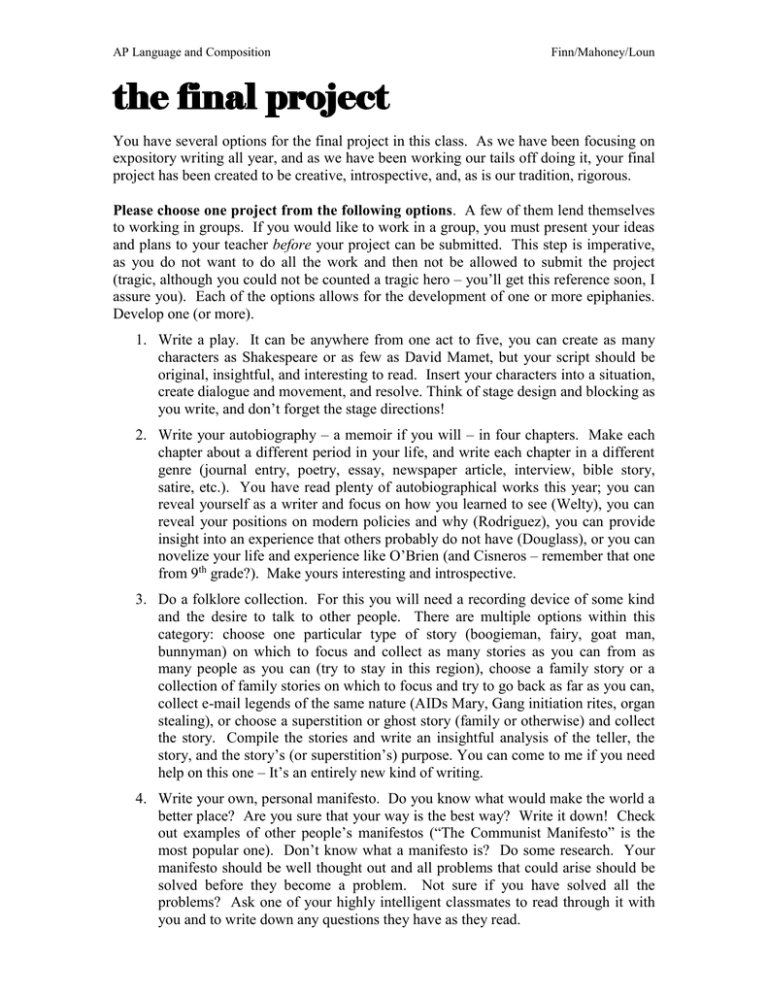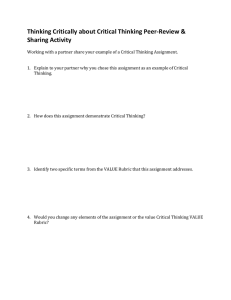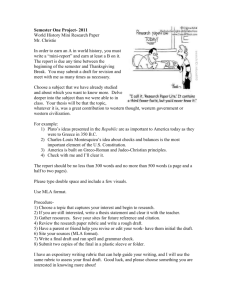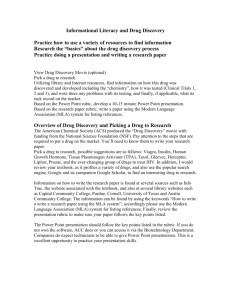the final project
advertisement

AP Language and Composition Finn/Mahoney/Loun the final project You have several options for the final project in this class. As we have been focusing on expository writing all year, and as we have been working our tails off doing it, your final project has been created to be creative, introspective, and, as is our tradition, rigorous. Please choose one project from the following options. A few of them lend themselves to working in groups. If you would like to work in a group, you must present your ideas and plans to your teacher before your project can be submitted. This step is imperative, as you do not want to do all the work and then not be allowed to submit the project (tragic, although you could not be counted a tragic hero – you’ll get this reference soon, I assure you). Each of the options allows for the development of one or more epiphanies. Develop one (or more). 1. Write a play. It can be anywhere from one act to five, you can create as many characters as Shakespeare or as few as David Mamet, but your script should be original, insightful, and interesting to read. Insert your characters into a situation, create dialogue and movement, and resolve. Think of stage design and blocking as you write, and don’t forget the stage directions! 2. Write your autobiography – a memoir if you will – in four chapters. Make each chapter about a different period in your life, and write each chapter in a different genre (journal entry, poetry, essay, newspaper article, interview, bible story, satire, etc.). You have read plenty of autobiographical works this year; you can reveal yourself as a writer and focus on how you learned to see (Welty), you can reveal your positions on modern policies and why (Rodriguez), you can provide insight into an experience that others probably do not have (Douglass), or you can novelize your life and experience like O’Brien (and Cisneros – remember that one from 9th grade?). Make yours interesting and introspective. 3. Do a folklore collection. For this you will need a recording device of some kind and the desire to talk to other people. There are multiple options within this category: choose one particular type of story (boogieman, fairy, goat man, bunnyman) on which to focus and collect as many stories as you can from as many people as you can (try to stay in this region), choose a family story or a collection of family stories on which to focus and try to go back as far as you can, collect e-mail legends of the same nature (AIDs Mary, Gang initiation rites, organ stealing), or choose a superstition or ghost story (family or otherwise) and collect the story. Compile the stories and write an insightful analysis of the teller, the story, and the story’s (or superstition’s) purpose. You can come to me if you need help on this one – It’s an entirely new kind of writing. 4. Write your own, personal manifesto. Do you know what would make the world a better place? Are you sure that your way is the best way? Write it down! Check out examples of other people’s manifestos (“The Communist Manifesto” is the most popular one). Don’t know what a manifesto is? Do some research. Your manifesto should be well thought out and all problems that could arise should be solved before they become a problem. Not sure if you have solved all the problems? Ask one of your highly intelligent classmates to read through it with you and to write down any questions they have as they read. AP Language and Composition Finn/Mahoney/Loun 5. Choose a topic you care so deeply about that it keeps you awake at night. Research the topic using online databases, personal interviews, and books (that’s right, books). You can use the internet sparingly, but you MUST make sure that your source is credible (see me if you don’t know). Write a persuasive research paper that defines the problem, identifies the issues, and offers a well researched solution. If you choose, you may make a documentary (reflect back on the documentaries we’ve seen this year for guidance) instead of writing a paper, but you must turn in a written copy of your script and all of your source material as part of your project, and this documentary must still identify the problem, issues, and a proposed solution, as well as the audience and purpose of your documentary. As with your AP Lang research paper, PAPERS SUBMITTED WITHOUT IN-TEXT REFERENCES AND/OR A WORKS CITED PAGE WILL RESULT IN AUTOMATIC FAILURE (50%). Evidence of plagiarism will result in zero points awarded. 6. Present a project to your teacher. If you are not interested in any of the above options, develop your own and bring your idea to the teacher. You will need to do this soon, so that the two of you (you and your teacher, of course) can start developing your idea into a workable project – and it must involve writing! These projects can be presented in multiple forms. A written copy is required, but if you want to make a documentary out of your folklore collection, produce and stage your play, or publish your autobiography on the web (with pictures, of course), please do not be discouraged from doing so. The more creative the presentation, the more pleasurable it is to grade (and you know what that means…wink wink). Here are the rules (yes, you heard me, rules): This project is worth 100 points. That’s right – it will play a major role in your 4th quarter grade. Make sure it’s the best work you’ve EVER done (so get started early, not late). The written copy of your work should be presented in MLA format - if you don't know what that is, check my webpage and click on the link for MLA called "Yeah! MLA" for directions. Make conscious choices about syntax and diction in order to accurately convey your purpose. Now here's the really fun part (and the really hard part)… You will be creating your own rubric for this assignment. You must create six traits for your rubric (come see me so that we make sure you’re on the right track). Your rubric should focus on what you, the writer, would like your teacher to focus on while grading. You will want to include things that you have done especially well in your project as well as things that you know you struggle with (forcing yourself, of course, to confront those struggles and thus transcend your self-imposed boundaries). Note that if you do NOT include a rubric or simply use a rubric already provided as an example, your overall grade will be reduced by ten percent (10%). Be original! You should make at least one appointment with your teacher during the course of the assignment to make sure that you are on the right track and that your working rubric adequately evaluates what you plan to accomplish (your purpose…ah, so that’s what writing is all about). AP Language and Composition DUE: Friday, May 20th No exceptions. None. Finn/Mahoney/Loun


